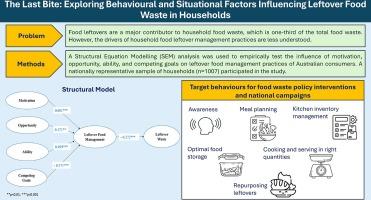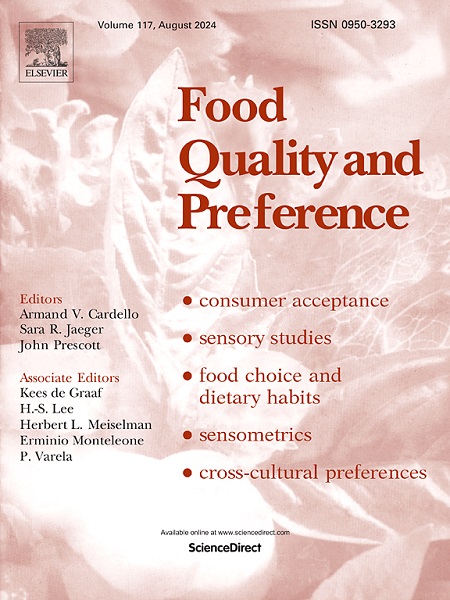最后一口:探索影响家庭剩余食物浪费的行为和情景因素
IF 4.9
1区 农林科学
Q1 FOOD SCIENCE & TECHNOLOGY
引用次数: 0
摘要
剩饭剩菜是造成家庭食物浪费的一个主要因素。然而,人们对家庭剩饭剩菜管理行为的驱动因素了解较少。本研究采用 "动机-机会-能力 "框架对剩饭剩菜管理行为进行了分析。通过结构方程建模(SEM)分析,实证检验了动机、机会、能力和竞争目标对澳大利亚消费者自我报告的剩饭剩菜管理行为的影响。结果表明,消费者的动机与剩饭剩菜管理行为密切相关。特别是,消费者之所以不愿浪费食物,是因为他们对浪费食物有负面情绪,并了解浪费剩饭剩菜的后果。消费者在膳食计划、高效烹饪、食品库存管理、保质期解读和食品储存方面的能力也对家庭剩饭剩菜管理有很大影响。时间、信息技术和生活方式对剩饭剩菜管理的影响相对较弱。既要吃到健康、安全和美味的食物,又要有足够的食物,这两个目标相互竞争,降低了人们对家庭剩饭剩菜管理的兴趣。了解剩饭剩菜管理的驱动因素可以指导设计干预措施,促进行为改变,防止剩饭剩菜浪费。本文章由计算机程序翻译,如有差异,请以英文原文为准。

The Last Bite: Exploring behavioural and situational factors influencing leftover food waste in households
Food leftovers are a major contributor to household food waste. However, the drivers of household food leftover management practices are less understood. This study analyses the leftover food management behaviour using the Motivation-Opportunity-Ability framework. A Structural Equation Modelling (SEM) analysis was used to empirically test the influence of motivation, opportunity, ability, and competing goals on self-reported leftover food management practices of Australian consumers. The results show consumers’ motivation is strongly associated with leftover food management practices. Particularly, consumers are motivated not to waste food because of negative feelings towards wasting food and understanding the consequences of leftover food waste. Consumer abilities in meal planning, efficient cooking, food inventory management, interpreting expiry dates, and food storage also significantly affected leftover food management in the home. The availability of time, information technology and lifestyle showed a relatively weaker impact on leftover food management. Competing goals of eating healthy, safe, and tasty food and having enough food lower the interest in leftover food management in the home. Understanding the drivers of leftover food management can guide designing interventions to promote behaviour change in preventing leftover waste.
求助全文
通过发布文献求助,成功后即可免费获取论文全文。
去求助
来源期刊

Food Quality and Preference
工程技术-食品科技
CiteScore
10.40
自引率
15.10%
发文量
263
审稿时长
38 days
期刊介绍:
Food Quality and Preference is a journal devoted to sensory, consumer and behavioural research in food and non-food products. It publishes original research, critical reviews, and short communications in sensory and consumer science, and sensometrics. In addition, the journal publishes special invited issues on important timely topics and from relevant conferences. These are aimed at bridging the gap between research and application, bringing together authors and readers in consumer and market research, sensory science, sensometrics and sensory evaluation, nutrition and food choice, as well as food research, product development and sensory quality assurance. Submissions to Food Quality and Preference are limited to papers that include some form of human measurement; papers that are limited to physical/chemical measures or the routine application of sensory, consumer or econometric analysis will not be considered unless they specifically make a novel scientific contribution in line with the journal''s coverage as outlined below.
 求助内容:
求助内容: 应助结果提醒方式:
应助结果提醒方式:


